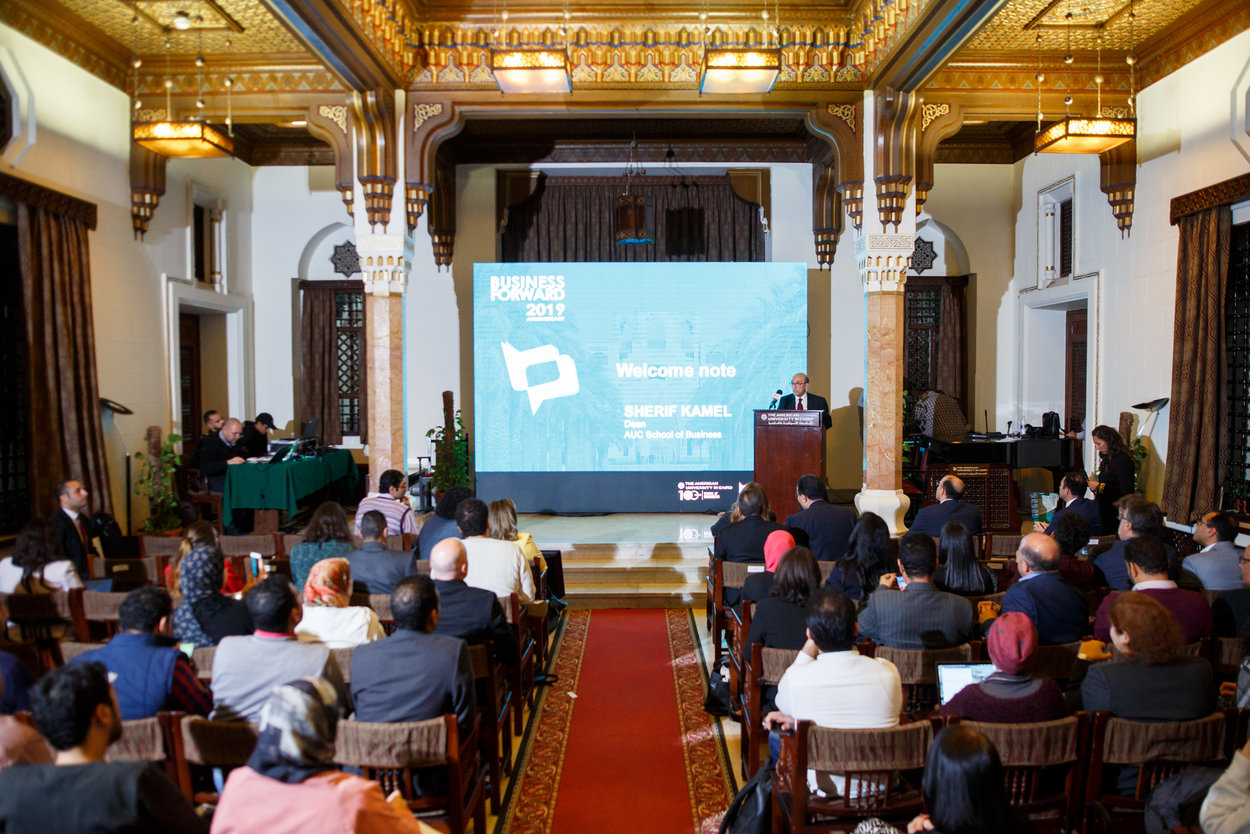On Monday, December 2, 2019, the AUC School of Business hosted the 2019 Anniversary of yours truly, Business Forward, gathering a number of key figures across different business sectors, academia, government agencies, and international NGOs operating in Egypt. At AUC Tahrir Square’s Oriental Hall, the distinguished speakers, each in their field, informed the audience their vision of the way forward for Egypt following the conclusion of the reform program; offering invaluable insight of the past, present, and potential future of the Egyptian economy.

The Business Forward 2019 Anniversary took off with a welcome note courtesy of Sherif Kamel, dean of the AUC School of Business, in which he walked the audience through the story of Business Forward since its inception two years ago, further stressing the school’s commitment to enriching the business ecosystem in Egypt through such initiatives. Before our first guest speaker, Ghada Labib, deputy minister of planning and administrative reform, took to the stage, the following video posed the event’s integral question to our guest speakers.
Administrative reform; what’s the way forward? Ft. Ghada Labib, deputy minister of planning for administrative reform.
“One of the significant indicators for us is measuring the level of corruption, or even the perception of the average system of corruption,” said Ghada Labib. “We no longer randomly select government empolyees to undergo extensive training based on ministries’ recommendation; rather we do a full assessment of the employees’ skills and abilities and make the decision based on the actual data base.”
Legislative reform; what’s the way forward? Ft. Aly Shalakany, senior partner at Shalakany law firm.
“Issuing legislation over the past few years has been happening at an unprecedented pace. It’s a real tough job to keep up with everything, I think the best laws that have been issued in the past few years have had a high degree of consultation,” said Aly Shalakany.
Global conglomerates operating in Egypt; what’s the way forward? Ft. Tamer Hamed, vice president, Near East markets, P&G.
“Everything we do needs to be about balance,” said Tamer Hamed. “Achieving that balance and maintaining growth across all our indicators is why we’ve been celebrated this year as the best P&G unit across Asia and Africa.”
Stay tuned for more.
Technology revolutionizing economic reform? Ft. Ahmed Aboudoma, cofounder, T20, former CEO, Mobily.
“The industrial revolution is not ‘at the door’,” explained Ahmed Aboudoma. “People are already living it daily, and the economies which can take full advantage of it are the ones which are going to see real progress.”
Stay tuned for more.
Role of international donor organizations in post-reform Egypt? Ft. Sherif Hamdy, senior operations officer, World Bank.
“During 2018/2019 [fiscal year], we focused on horizontal reform,” said Sherif Hamdy. “Reforms that are cross-cutting issues, like licensing, fiscal issues, exchange rate, and so on. However, we need to direct more of our effort towards vertical reform; concentrating on specific sectors and fully understanding what’s the market configuration for these sectors.”
Stay tuned for more.
Social justice integral to economic reform? Ft. Laila Iskandar, founder, CID Consulting.
“Contrary to common belief, informal workers and firms contribute to tax collection efforts both directly, through indirect taxes and presumptive taxes, and indirectly, through the links between formal and informal outputs,” explained Laila Iskandar.
From reform to environmental economics; fireside chat. Ft. Aber ElShenawy, economics professor, AUC; Angus Blair, CIB professor of practice, AUC; Ahmed Zahran, CEO and founder, KarmSolar.
“What actually happens is that those types of market incentives give opportunity for businesses to cheat them,” explained Ahmed Zahran. “This always happens, and the reason is that the main incentive for businesses is that they try to outsmart the system. Once you put a tax or credit incentive, you’re actually giving an opportunity to those who would be able to get the upper hand and outgrow the others who are sticking to the rules.”









